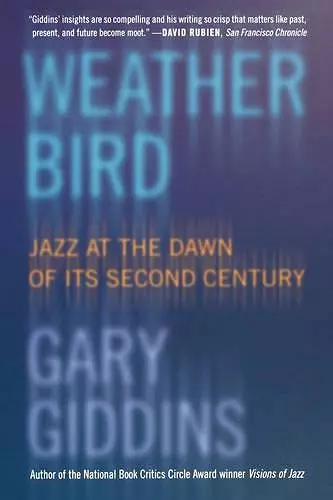Weather Bird
Jazz at the Dawn of Its Second Century
Format:Paperback
Publisher:Oxford University Press Inc
Published:29th Jun '06
Currently unavailable, and unfortunately no date known when it will be back

Gary Giddins's magnificent book Visions of Jazz has been hailed as a landmark in music criticism. Jonathan Yardley in The Washington Post called it "the definitive compendium by the most interesting jazz critic now at work." And Alfred Appel, Jr., in The New York Times Book Review, said it was "the finest unconventional history of jazz ever written." It was the first work on jazz ever to win the National Book Critics Circle Award for Criticism. Now comes Weather Bird, a brilliant companion volume to Visions of Jazz. In this superb collection of essays, reviews and articles, Giddins brings together, for the first time, more than 140 pieces written over a 14-year period, most of them for his column in the Village Voice (also called "Weather Bird"). The book is first and foremost a celebration of jazz, with illuminating commentary on contemporary jazz events, on today's top musicians, on the best records of the year, and on leading figures from jazz's past. Readers will find extended pieces on Louis Armstrong, Erroll Garner, Benny Carter, Sonny Rollins, Dave Brubeck, Ornette Coleman, Billie Holiday, Cassandra Wilson, Tony Bennett, and many others. Giddins includes a series of articles on the annual JVC Jazz Festival, which taken together offer a splendid overview of jazz in the 1990s. Other highlights include an astute look at avant-garde music ("Parajazz") and his challenging essay, "How Come Jazz Isn't Dead?" which advances a theory about the way art is born, exploited, celebrated, and sidelined to the museum. A radiant compendium by America's leading music critic, Weather Bird offers an unforgettable look at the modern jazz scene.
"Giddins has been recognized as the Duke, the Count, the Earl of jazz writers.... No one puts it together like Giddins, whose writing is an unmatched combination of big ideas, witty wordsmithery, historical insight, and musicological know-how.... Thumbing through 'Weather Bird' is like listening to some of your old favorites--and being astonished as you still hear new things.... Giddins has set the bar for jazz scholarship so high no one is likely to top it.... His jazz column was a thing to be treasured--as is this collection."--Will Friedwald, New York Sun
"The breadth and depth of Giddins's knowledge is extremely impressive, his ear is astounding, and his masterly style routinely achieves the near impossible in writing engagingly about something that inherently eludes description.... The book stands on its own, but taken with Giddins's acclaimed Visions of Jazz: The First Century, it affords the reader a highly accessible, personal, and perceptive portrait of the development of jazz and its towering figures (and some lesser-known but significant talents), from its beginnings to the present."--Library Journal
"There is an indescribable joy in finding writers who not only know how to cleverly turn a phrase, but who truly understand how to imbue their writing with personality, life and a personal perspective that makes a reader want to keep coming back for more. Jazz writer Gary Giddins is such writer.... From Louis Armstrong to The Bad Plus, from Dave Holland to Dave Douglas, from Sonny Rollins to David S. Ware and Charlie Christian to Charles Mingus, Weather Bird is about as comprehensive a critical look at jazz as one can find in 600 pages."--John Kelman, allaboutjazz.com
"Anyone interested in the artistry and importance of jazz should read this book. Anyone interested in the history of our culture should read this book. Gary Giddins eloquently deciphers the mysteries of jazz in Weather Bird. I was enterained by every page. I learned something and was inspired by every page." --Michael Connelly
- Winner of One of ^ISan Jose Mercury News'^R Top Non-Fiction Books of 2004.
ISBN: 9780195304497
Dimensions: 225mm x 154mm x 39mm
Weight: 853g
656 pages